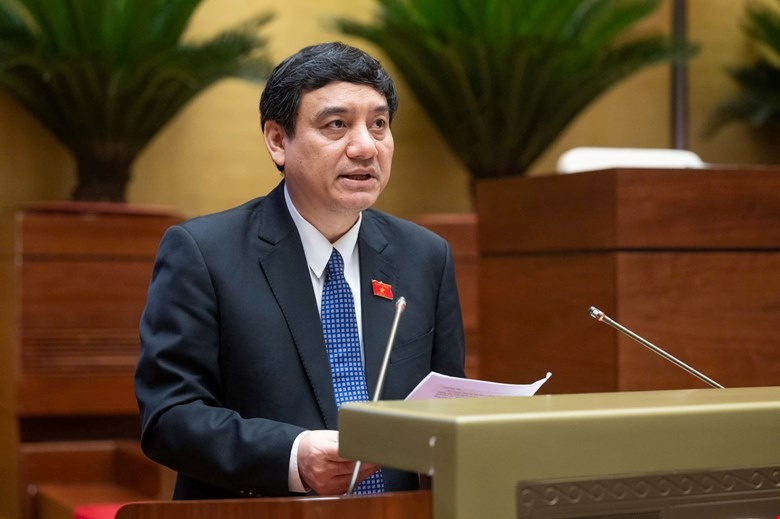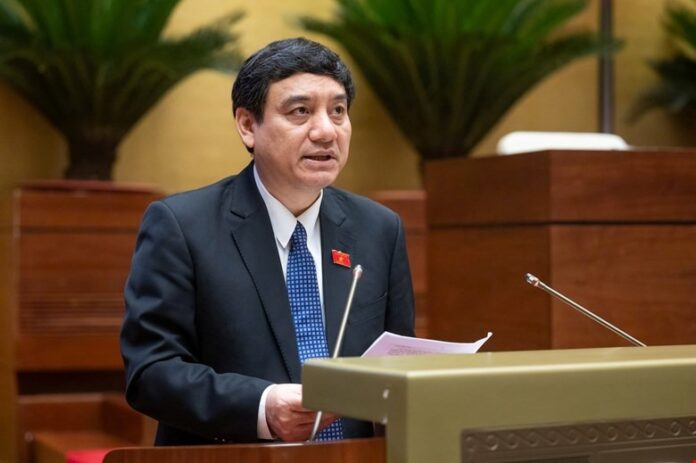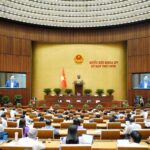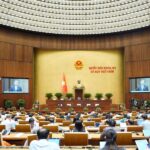National Assembly Discusses Amendments to the Labor Law
On May 7, the National Assembly continued its 9th session, discussing amendments to the Labor Law, with a focus on unemployment benefits for workers.

Chairman of the Culture and Society Committee, Nguyen Dac Vinh. Photo: Pham Thang
Before the National Assembly’s discussion, on behalf of the National Assembly Standing Committee, Chairman Nguyen Dac Vinh presented a report on the absorption, explanation, and editing of the draft law. The draft law presented at this session consists of 8 chapters and 58 articles (a reduction of 1 chapter and 36 articles compared to the draft law presented at the 8th session).
Regarding the suggestion to remove the provision that workers who are fired or disciplined and forced to leave are not entitled to unemployment insurance, the National Assembly Standing Committee accepted this feedback and removed the provision from the draft law.
Article 40 of the draft law details the conditions for receiving unemployment benefits. Accordingly, the following cases are not eligible for unemployment benefits: workers who unilaterally terminate their labor contracts in violation of the Labor Law; unilaterally terminate their work contracts in violation of the Law on Civil Servants; or retire with a full pension.
Workers who are currently employed, performing military or public security duties, studying for a period of more than 12 months, undergoing compulsory education or rehabilitation measures, temporarily detained or serving a prison sentence, emigrating, working abroad under a contract, or deceased are also not eligible for unemployment benefits.
Article 41 stipulates that the monthly unemployment benefit shall be equal to 60% of the average monthly salary of the last 6 months of unemployment insurance contributions, but not more than 5 times the regional minimum wage announced by the Government and applied in the last month of unemployment insurance contribution.
The duration of unemployment benefit entitlement is calculated based on the number of months of unemployment insurance contributions, with a contribution of 12 to 36 months entitling the recipient to 3 months of benefits. Subsequently, for every additional 12 months of contributions, one more month of benefits is added, up to a maximum of 12 months.
Removal of the Provision on Non-Reservation of Unemployment Insurance Contributions Exceeding 144 Months
Regarding the duration of unemployment insurance contributions that cannot be reserved, many opinions suggested removing the provision that contributions exceeding 144 months are not reserved for calculating unemployment benefits for the next time.
The National Assembly Standing Committee acknowledged that this content was not included in the current Law but was stipulated in Circular No. 15/2023/TT-BLDTBXH dated December 29, 2023, of the Ministry of Labor, Invalids, and Social Affairs. The draft law presented at the 8th session of the National Assembly had included this content.
In the spirit of innovative thinking in law-making, the National Assembly Standing Committee accepted the feedback and directed the editing of the draft law to remove this provision.
“Revolutionizing Social Housing Investments: Slashing Processing Times by 70%”
The government has proposed a 70% reduction in processing time for social housing projects, expediting project development and answering the long-awaited calls of both businesses and citizens.
Crafting Compelling Content to Counteract Trade Tax Turbulence
The US tariff policy and the subsequent reactions from other countries are expected to significantly impact the Vietnamese labor market, particularly those directly employed by exporting enterprises. This may result in labor reductions or shifts, causing a potential disruption to the country’s employment landscape.
A Proposal to Adjust Excise Tax Rates for Select Products and Commodities
The proposed revisions to the Special Consumption Tax Law offer a nuanced approach to taxation. Alongside exempting smaller air conditioners from special consumption tax, the draft law addresses nuanced scenarios, such as exported goods that have already incurred special consumption tax being returned from abroad. Additionally, it proposes adjustments to tax rates for pick-up trucks and a revised plan for implementing tax rates on alcoholic beverages from 2027 onwards.





















